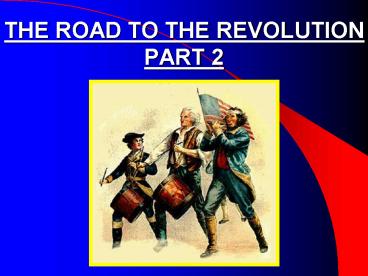THE ROAD TO THE REVOLUTION PART 2 - PowerPoint PPT Presentation
1 / 23
Title:
THE ROAD TO THE REVOLUTION PART 2
Description:
THE BOSTON TEA PARTY. English response to the. Boston Tea Party. Intolerable Acts of 1774 (Coercive Acts) INTOLERABLE ACTS (1774) ... – PowerPoint PPT presentation
Number of Views:100
Avg rating:3.0/5.0
Title: THE ROAD TO THE REVOLUTION PART 2
1
THE ROAD TO THE REVOLUTIONPART 2
2
THE STAMP ACT CONGRESS
- October 1765 Nine colonies sent 27 delegates to
New York to criticize the Stamp Act and English
taxes, but not for revolution. - James Otis Taxation without representation is
tyranny. - This is the first time the colonies acted
together to protest against England.
3
What did the Stamp Act Congress pass?
- The merchants agree to stop importing British
goods. - Attempts will be made to intimidate all stamp
distributors. - The Congress agrees to refrain from doing
business that requires stamps. - Demand that Parliament repeal the Sugar Act and
the Stamp Act. - Accept the authority of Parliament to legislate
the colonies, but not to give Parliament the
right to tax the colonies or to hold trials in
the Admiralty Courts.
4
English Response to the Stamp Act Congress
- Parliament repeals the Stamp Act, but on the same
day announces the Declaratory Act. - Declaratory Act (1766) This act simply states
that Parliament does have the power to tax and
pass laws it sees necessary for the colonies.
- William Pitt was a opponent of
the Declaratory Act.
5
English Response to the Stamp Act Congress
- Virtual Representation A member of Parliament
not only represents the people who elected him,
but also all persons throughout the empire.
6
CHARLES TOWNSHENDSecretary of the Treasury
7
TOWNSHEND ACTS (1767)
- Duties (tax) on colonial imports of paper, lead,
glass, and tea. - New York assembly actions are null and void until
they provide supplies under the Quartering Act. - A Special Board headquartered in Boston will
collect the taxes.
8
Colonial Response to the Townshend Acts
- Boycott colonies refused to buy these goods.
- This non-violent protest hurt English merchants
badly. - In 1770, except for the duties on tea and
quartering of troops, the English merchants get
this act repealed.
9
THE BOSTON MASSACRE
- Bostonians resented the Redcoats from the
Quartering Act of 1765 and tension grew over the
Townshend Acts.
10
- On March 5, 1770 The Redcoats order the crowd
of protestors to break up, but instead the crowd
threw snowballs, ice, etc. and boxed in the
soldiers.
11
- The Redcoats fire killing five people, including
Crispus Attucks.
12
- Samuel Adams Creates anti-British propaganda
- He labeled the event the Boston Massacre, but it
did not spark the Revolution. - Committees of Correspondence will insure
communication between colonies and publicize all
British atrocities.
13
BOSTON MASSACRE
14
ENGLISH PRIME MINISTER
Lord North
15
THE TEA ACT of 1773
- All tea purchased by the colonies must be
purchased from the East India Company which gave
them a monopoly.
- To demonstrate that Parliament had the power to
tax the colonies, a small tax was left on the
tea, though the tea remained cheap.
16
Colonial Response to the Tea Act of 1773
- On December 16, 1773, to demonstrate that the
colonies will not pay any Parliamentary tax,
Samuel Adams and the Sons of Liberty, dressed up
like Mohawks and in an open display dumped the
tea into Boston Harbor.
Sons of Liberty
17
THE BOSTON TEA PARTY
18
English response to the Boston Tea Party
- Intolerable Acts of 1774 (Coercive Acts)
19
INTOLERABLE ACTS (1774)
- Boston Port Act Closed Bostons harbor until the
tea was paid for.
20
- The Administration of Justice Act General
Thomas Gage was put in charge of Massachusetts
and could send the trial of soldiers and
officials who killed protestors back to England.
21
- King George III replaced elected officials with
appointed ones in Massachusetts. - Quartering Act of 1774 Placed soldiers directly
in peoples homes in Boston.
22
Quebec Act of 1774
- Stated that Catholics can practice their
religion. - Extended the area of Quebec into the Ohio River
Valley. - Placed a royal governor in charge of Quebec.
23
FIRST CONTINENTAL CONRESS (1774)




























![❤️[READ]✔️ The Road to Fatima Gate: The Beirut Spring, the Rise of Hezbollah, and the Iranian Wa PowerPoint PPT Presentation](https://s3.amazonaws.com/images.powershow.com/10122502.th0.jpg?_=202409060112)


